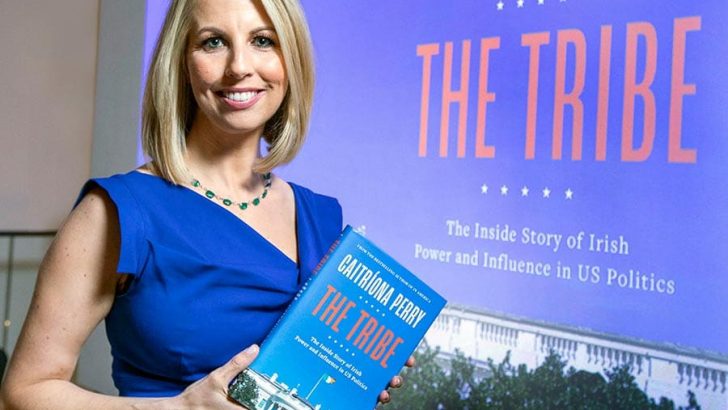The Tribe: The Inside Story of Irish Power and Influence in US Politics
by Caitríona Perry (Gill Books, €22.99/ £19.99)
Felix M. Larkin
It is often said that the US is a “melting pot”, a fusion of nationalities and ethnicities – but that is true only to some extent. Many Americans, even those whose ancestors came over on the Mayflower, retain a strong sense of their non-American antecedents.
This helps define their social and cultural identity, and their politics. Irish-Americans are no different in this respect from other hyphenated Americans, though they have been better organised and therefore more powerful politically than most of the others – especially in the major urban areas of the north-east and mid-western states, where they tended to settle upon arrival in America.
Are they still a force to be reckoned with in US politics? That is the question Caitríona Perry seeks to address in this book, and she was well placed to do it as RTÉ’s former Washington correspondent – and highly acclaimed in that role.
The book is based largely on interviews with a wide range of Irish-American politicians – including Congressman Brian Boyle, now the only member of the US Congress with an Irish-born parent, and Mick Mulvaney, former congressman and President Trump’s Acting Chief of Staff.
The book is based largely on interviews with Irish-American politicians”
The current Irish ambassador in Washington, Dan Mulhall, and his predecessor, Anne Anderson, have also been interviewed by Perry and their insights on Irish power and influence in the US today are of particular interest.
There is much – too much – direct reporting of these interviews, and this results in a somewhat disjointed and repetitive book. However, the message that is conveyed is crystal clear: “Irish-America as a cohesive political voting bloc is dead and gone”.
While Irish-Americans have rallied around certain candidates in the past – notably, presidents Kennedy, Reagan and Clinton – it is generally agreed that this could not now be repeated. Irish-America is every bit as divided on political matters as the rest of the US. Drawing a positive conclusion from that, Perry points out that this “is a sign of a mature and assimilated population”.
The most obvious sign of the new political divisions within the ranks of Irish-Americans is that they no longer vote solidly for the Democratic Party. Thus, many of them supported Trump against Hillary Clinton in 2016 despite the overwhelming support her husband received from the Irish-American community in 1992 and 1996.
This reflects the growing affluence of Irish-Americans, but issues such as gay marriage and abortion have also caused many Irish-Americans to abandon their long association with the Democrats. On these issues – and also on issues such as partition and support for violent republicanism – Irish-America is more traditional in its views than the majority of the Irish at home in Ireland.
Differences
The differences between Irish-America and the homeland are perhaps not fully appreciated on either side of the Atlantic Ocean, and it is good to be reminded by Perry that “there is a difference between Ireland as it is and Irish-America’s perception of it” and that “Irish-America is not Ireland; it is, at best, a distant relative”.
These differences and the collapse of the Irish-American voting bloc have not, however, compromised what Perry calls the “soft power, a quiet influence,” that Irish-America and, by extension, the island of Ireland continue to enjoy in America.
This is plainly in evidence each year on St Patrick’s Day, an occasion for high-profile festivities throughout the US and some serious networking between senior Irish and US political figures in Washington – including the much-hyped presentation of a bowl of shamrock to the President at the White House.
No other group of hyphenated Americans and the representatives of the country from whence they came get such access to the elite of American politics – and, as Anne Anderson points out in her interview recorded in this book, “there is a spillover from St Patrick’s Day that lasts year-round, and that is why that access is so precious”.
It underpins a relationship between Ireland and the US that is characterised by Perry as one “that lies in the background, unsullied by partisanship, greater than the leaders of the day in both counties”.


 Caitriona Perry.
Pic: Brian McEvoy/Evoke.ie
Caitriona Perry.
Pic: Brian McEvoy/Evoke.ie 